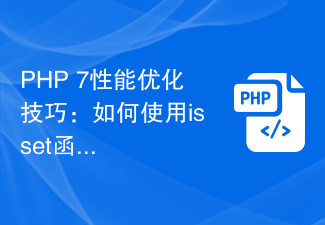PHP function performance optimization tips include: avoiding unnecessary object creation; reducing the number of function calls; using function caching; optimizing database queries; using third-party tools to analyze and optimize performance.

PHP function performance optimization tips
Performance optimization of PHP functions is crucial because it can greatly improve the response of the application speed. This article will introduce several practical optimization techniques to help you improve the performance of PHP functions.
1. Avoid creating unnecessary objects
Creating objects is a time-consuming operation, and unnecessary object creation should be avoided as much as possible. Consider using static methods or caching the object in a class.
Example:
// 不使用对象
function get_current_date() {
return date('Y-m-d');
}
// 使用静态方法
class DateHelper {
public static function get_current_date() {
return date('Y-m-d');
}
}2. Reduce the number of function calls
Each function call will increase the overhead, by reducing the number of function calls The number of calls can improve performance. Consider using temporary variables or caching results to reduce the number of calls.
Example:
// 减少函数调用次数
function calculate_average($data) {
$sum = 0;
$count = 0;
foreach ($data as $value) {
$sum += $value;
$count++;
}
return $sum / $count;
}3. Using function cache
Frequently called functions can be accelerated by using cache. PHP has a built-in accelerator extension that can be used to cache results for functions.
Example:
// 使用函数缓存
function get_cached_data() {
$cache = new Cache();
$data = $cache->get('my_data');
if (!$data) {
$data = load_data_from_database();
$cache->set('my_data', $data);
}
return $data;
}4. Optimize database queries
Database queries are a common performance bottleneck in PHP applications. Database queries can be optimized using indexes, proper connection pooling, and query caching.
Example:
// 使用索引优化查询 $sql = 'SELECT * FROM users WHERE username LIKE :username'; $stmt = $db->prepare($sql); $stmt->execute([':username' => '%john%']);
5. Use third-party tools
There are many third-party tools that can help analyze and optimize PHP Function performance. For example, Xdebug can be used to analyze execution time and memory consumption.
By applying these tips, you can significantly improve the performance of your PHP functions, thereby improving your application's responsiveness and user experience.
The above is the detailed content of PHP function performance optimization tips. For more information, please follow other related articles on the PHP Chinese website!
 使用PHP开发实现百度文心一言API接口的性能优化技巧Aug 26, 2023 pm 10:39 PM
使用PHP开发实现百度文心一言API接口的性能优化技巧Aug 26, 2023 pm 10:39 PM使用PHP开发实现百度文心一言API接口的性能优化技巧随着互联网的普及,越来越多的开发者使用第三方API接口来获取数据,以丰富自己的应用内容。百度文心一言API接口是广受欢迎的一种数据接口,它可以返回一句随机的励志、哲理或者温馨的语句,可以用于美化程序界面、增加用户体验等方面。然而,在使用百度文心一言API接口时,我们也面临一些性能上的考虑。API调用的速度
 如何使用 PHP 优化网站性能和加载速度Sep 12, 2023 am 10:13 AM
如何使用 PHP 优化网站性能和加载速度Sep 12, 2023 am 10:13 AM如何使用PHP优化网站性能和加载速度随着互联网的快速发展,网站的性能和加载速度越来越受到人们的关注。而作为一种广泛使用的服务器端脚本语言,PHP在优化网站性能和加载速度方面具有重要作用。本文将介绍一些使用PHP的技巧和方法,以提高网站的性能和加载速度。使用缓存机制缓存是提高网站性能的一种有效方法。PHP提供了多种缓存机制,如文件缓存、内存缓存和数
 如何通过PHP代码规范规范性能优化Aug 11, 2023 pm 03:51 PM
如何通过PHP代码规范规范性能优化Aug 11, 2023 pm 03:51 PM如何通过PHP代码规范规范性能优化引言:随着互联网的迅速发展,越来越多的网站和应用程序基于PHP语言开发。在PHP开发过程中,性能优化是一个至关重要的方面。一个高性能的PHP代码可以显著提高网站的响应速度和用户体验。本文将探讨如何通过PHP代码规范来规范性能优化,并提供一些实际的代码示例供参考。一、减少数据库查询在开发过程中,频繁的数据库查询是一个常见的性能
 如何使用PHP进行性能优化和调优Aug 02, 2023 pm 09:40 PM
如何使用PHP进行性能优化和调优Aug 02, 2023 pm 09:40 PM如何使用PHP进行性能优化和调优在开发Web应用的过程中,性能优化和调优是不可忽视的重要任务。PHP作为一种流行的服务器端脚本语言,也有一些能够提高性能的技巧和工具。本文将介绍一些常见的PHP性能优化和调优方法,并提供示例代码以帮助读者更好地理解。使用缓存缓存是提高Web应用性能的重要手段之一。可以通过使用缓存来减少对数据库的访问,减少IO操作以提高性能。使
 Numpy库常用函数大全:优化代码,加速数据处理速度Jan 19, 2024 am 10:05 AM
Numpy库常用函数大全:优化代码,加速数据处理速度Jan 19, 2024 am 10:05 AMNumpy库是Python中一个重要的科学计算库,它提供了高效的多维数组对象以及丰富的函数库,可以帮助我们更加高效地进行数值计算和数据处理。本文将介绍一系列Numpy库中常用的函数,以及如何使用这些函数优化代码,加速数据处理速度。创建数组我们常用的创建数组函数有:np.array():将输入数据转为ndarray对象,可以通过指定dtype来指定数组的数据类
 PHP 7性能优化技巧:如何使用isset函数判断变量是否已声明Aug 01, 2023 am 08:27 AM
PHP 7性能优化技巧:如何使用isset函数判断变量是否已声明Aug 01, 2023 am 08:27 AMPHP7性能优化技巧:如何使用isset函数判断变量是否已声明引言:在PHP开发中,我们经常需要判断一个变量是否已经被声明。这在一些情况下尤其重要,例如在使用未声明的变量时会产生错误。在PHP7中,出于性能优化的考虑,我们应该尽量使用isset函数来判断变量是否已经被声明,而不是直接使用诸如empty、is_null等函数。为什么使用isset:在PHP
 优化你的代码:PHP高性能技巧Jun 05, 2023 am 08:21 AM
优化你的代码:PHP高性能技巧Jun 05, 2023 am 08:21 AM在实际开发中,为了让网站或应用程序达到更好的性能和更高的可扩展性,PHP代码的优化是非常重要的一步。以下是一些PHP高性能技巧,帮助你的代码更快地运行。一、最小化函数调用和变量1.1函数调用函数调用对于PHP代码的性能影响非常大,因为每个函数都需要在内存中分配空间。在编写PHP代码时应尽量避免过多的函数调用,可以使用内联函数或自定义函数来替代。1.2变量
 如何通过PHP提高网站的性能和响应速度?Sep 10, 2023 pm 02:22 PM
如何通过PHP提高网站的性能和响应速度?Sep 10, 2023 pm 02:22 PM如何通过PHP提高网站的性能和响应速度?随着互联网的发展,网站的性能和响应速度对于用户体验和搜索引擎的优化越来越重要。PHP作为一种常用的服务器端脚本语言,对于提高网站的性能和响应速度也起到了关键作用。本文将介绍一些通过PHP提高网站性能和响应速度的方法。一、优化代码使用合适的PHP版本:选择最新的稳定版本,并结合自己的应用需求选择合适的运行方式(CGI/F


Hot AI Tools

Undresser.AI Undress
AI-powered app for creating realistic nude photos

AI Clothes Remover
Online AI tool for removing clothes from photos.

Undress AI Tool
Undress images for free

Clothoff.io
AI clothes remover

AI Hentai Generator
Generate AI Hentai for free.

Hot Article

Hot Tools

Safe Exam Browser
Safe Exam Browser is a secure browser environment for taking online exams securely. This software turns any computer into a secure workstation. It controls access to any utility and prevents students from using unauthorized resources.

PhpStorm Mac version
The latest (2018.2.1) professional PHP integrated development tool

ZendStudio 13.5.1 Mac
Powerful PHP integrated development environment

SublimeText3 Linux new version
SublimeText3 Linux latest version

Notepad++7.3.1
Easy-to-use and free code editor






